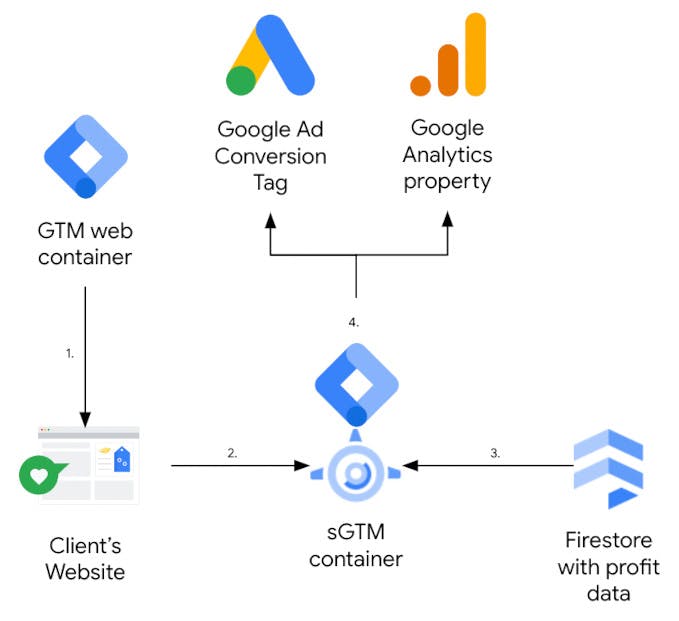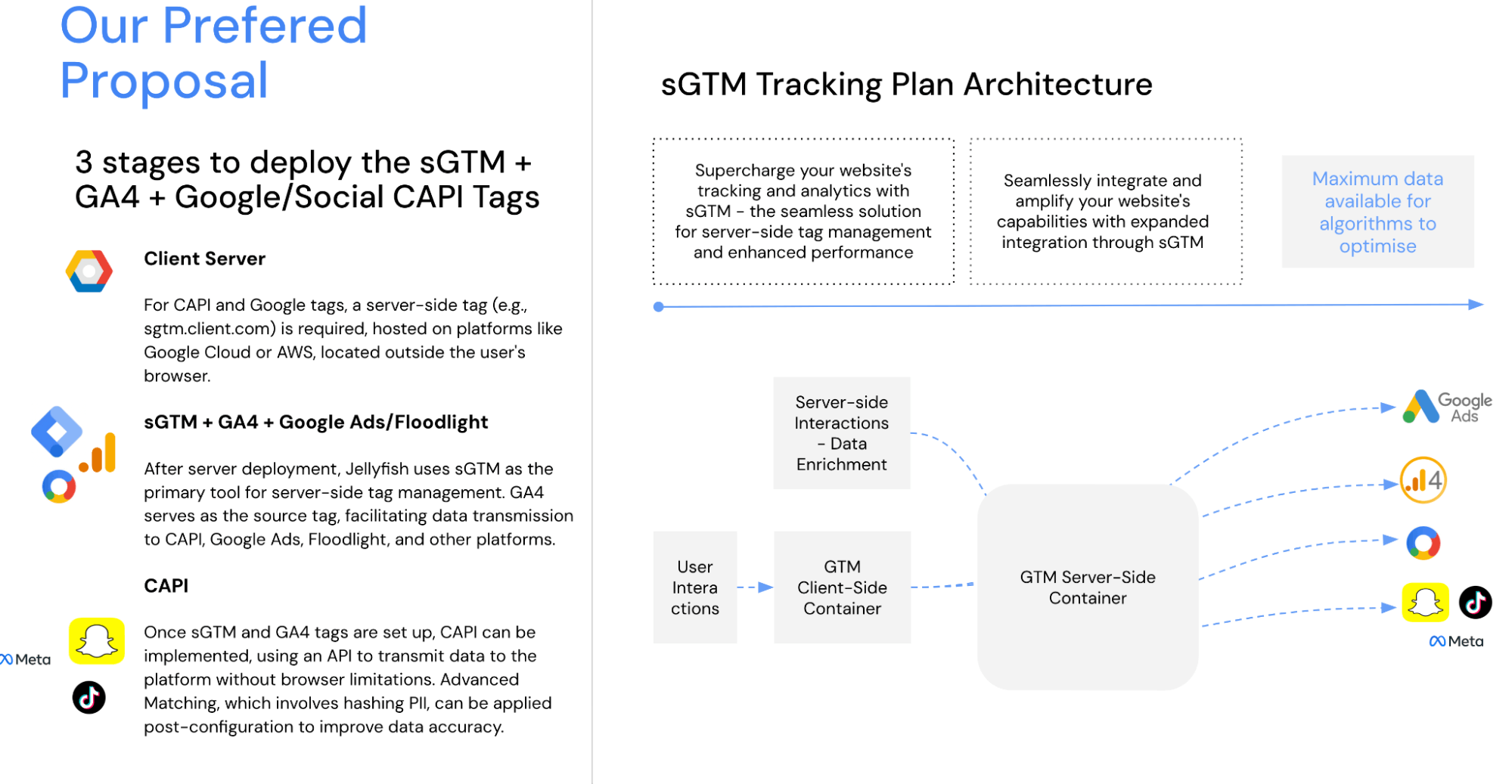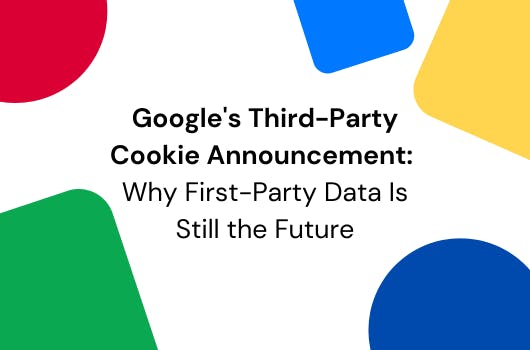Value-Based Bidding: Start bidding on the customers who impact your bottom line
Discover how Value-Based Bidding (VBB) can revolutionize your advertising approach by targeting customers who truly impact your bottom line.
Read Article2023-09-07
In the ever-evolving world of digital marketing, staying ahead of the curve is crucial for success. With Apple's iOS 17 privacy changes shaking up the industry, understanding the impact on value-based bidding and adopting solutions based on server-side tagging has become imperative to stay competitive.
In this article, I will explore the implications of iOS 17 on digital marketing, specifically value-based bidding strategies that are no longer durable, and how we at Jellyfish view the future of value-based bidding.
Apple's iOS 17 has ushered in a significant privacy update called Link Tracking Protection. This update directly affects marketers and any company utilizing click identifiers, particularly in the context of user-level tracking protection within Safari Private Browsing, Mail, and Messages. Safari enjoys a substantial market share in the browser space (currently almost 26% market share, according to SimilarWeb), making this development a pivotal moment for marketers. It's not just a minor adjustment; it signals a potential new paradigm for measuring marketing efforts on the web.

Screenshot from Apple Press Release, August 2023
Link tracking in iMessages, iMail, and private browsing on Safari on all devices will be affected. Given Safari's global popularity (second to Google’s Chrome), this is a substantial change that marketers must thoroughly comprehend. Understanding these shifts is vital for maintaining the effectiveness of marketing campaigns both now and in the future.
While Apple has not officially announced the parameters to be removed from URLs, they have hinted at the redaction of click IDs while sparing campaign IDs. This hint suggests that identifiers like Google click IDs (GCLID/DCLID) or Meta click IDs (FBCLID) may face redaction while UTM parameters remain unaffected. Click IDs are instrumental in tracking individual users from ad click, to website conversions, whereas UTM parameters operate at an aggregate level.
Additionally, user-level IDs play a vital role in the attribution capabilities of major platforms. Removing these IDs could lead to complications in reporting conversions, bidding strategies, and optimising conversion-based campaigns.
Of particular significance is Google Ads Auto Tagging, which forms a cornerstone of Google's advertising infrastructure. It heavily relies on the GCLID/DCLID as a key identifier for attributing clicks to web and app data. Furthermore, it is widely recognized as best practice, primarily due to the potential issues associated with custom tagging.
It is confirmed that the GCLID/DCLID parameter will be removed (private browsing mode), which is expected to disrupt the attribution process for Ads.
The adjustment may not be as disruptive as it appears for app advertisers, but operational requirements for app developers and product owners will likely increase. However, the uncertainty surrounding which URL parameters will be removed makes assessing the impact challenging for web advertisers. As stated above, attribution is the largest shift, potentially making reporting and optimising conversions in digital platforms harder.
The impact on analytics remains unclear and depends on the specifics of Apple's updates. We might witness a higher proportion of traffic being categorized as 'direct,' leading to decreased accuracy in distinguishing new versus returning users from iOS and Safari.
Currently, the profitability process involves numerous ingestion models for the digital buying doors, such as Google Ads or Google Marketing Platform’s Search Ads 360 (SA360). Most of them are impacted by this new privacy change from Apple - leaving us with limited ‘durable’ and ‘future-proof’ solutions.
Let's explore solutions for profit ingestion:
In this evolving landscape, sGTM emerges as a resilient and durable measurement and activation solution. As it does not depend on non-durable IDs or click identifiers, making it a stable choice for maintaining bid strategies and leveraging AI/ML models based on enriched 1st party and modeled data.
For more information on sGTM and why Jellyfish believes it is the future of measurement, read this article.
sGTM sets the foundations for the future of durable measurement, and keeps activation strategies intact - as it does not rely on non-durable IDs nor click IDs, keeping your bid strategies live and thriving.
Combining sGTM with Consent Mode and Enhanced conversions will supercharge your AI/ML models being based both on enriched 1st party and modeled data.
Utilizing sGTM with Firestore in Google Cloud Platform (GCP), Soteria connects sensitive profit data with SA360 transactions in real-time. This integration empowers marketers to send total and profit values at the product and basket level, enabling profit feeds to seamlessly integrate with bidding algorithms and AI models within a privacy-safe closed ecosystem.


Data Accuracy: By reducing the reliance on browser-based tracking, sGTM minimizes data discrepancies and ensures that your insights are based on reliable information.
Privacy Compliance: sGTM aligns seamlessly with privacy regulations. It significantly reduces the exposure of user data to third-party scripts, fostering a more transparent and privacy-friendly user experience.
Improved Performance: With server-side processing, your website's load times remain optimal, enhancing user satisfaction and reducing bounce rates.
Future-Proofing: As the digital landscape evolves, sGTM provides a solid foundation for your measurement strategies, ensuring longevity and adaptability.
The iOS 17 privacy changes are reshaping the digital marketing landscape. Marketers must adapt to these changes by understanding their implications and exploring innovative solutions like server-side strategies such as Soteria to navigate this evolving terrain successfully.

Discover how Value-Based Bidding (VBB) can revolutionize your advertising approach by targeting customers who truly impact your bottom line.
Read Article
In a (not so) surprising turn of events, Google announced that it would not be deprecating third-party cookies as planned. This decision sent ripples through the digital advertising and marketing industries, leaving many advertisers wondering about the implications for their data strategies. Despite this unexpected move, here at Jellyfish, we still believe in the importance of investing in first-party data, and server-side tagging remains as critical as ever.
Read Article
As third-party cookies phase out, the overhaul of Australia’s Privacy Act 1988 is set to bring significant changes by August. This article explores the origins, key proposals, and impacts on the advertising landscape, and how Jellyfish Australia is helping clients navigate this privacy-centric transition.
Read Article